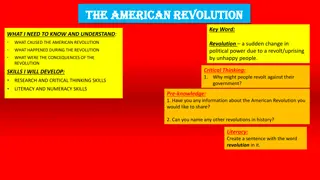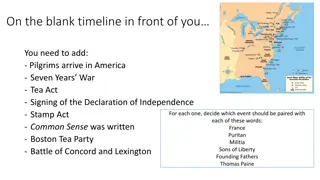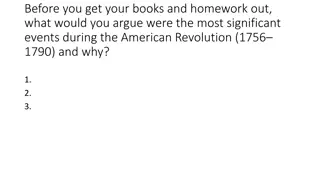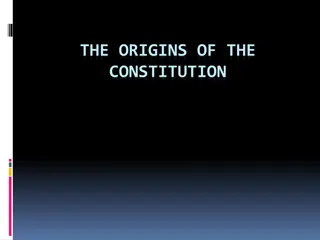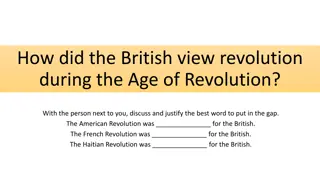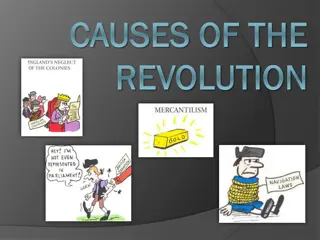
Causes and Impact of American Revolutionary War: A Comparative Study
Explore the political, economic, and social factors leading to the French Revolution as well as the causes, results, and European impact of the American Revolution. Delve into how the formation of a new nation took shape post-independence, highlighting key events like the Treaty of Paris and formation of the U.S. Constitution.
Download Presentation

Please find below an Image/Link to download the presentation.
The content on the website is provided AS IS for your information and personal use only. It may not be sold, licensed, or shared on other websites without obtaining consent from the author. If you encounter any issues during the download, it is possible that the publisher has removed the file from their server.
You are allowed to download the files provided on this website for personal or commercial use, subject to the condition that they are used lawfully. All files are the property of their respective owners.
The content on the website is provided AS IS for your information and personal use only. It may not be sold, licensed, or shared on other websites without obtaining consent from the author.
E N D
Presentation Transcript
Ch. 19 - A REVOLUTION IN POLITICS: THE ERA OF THE FRENCH REVOLUTION AND NAPOLEON AP THEMATIC QUESTIONS TO THINK ABOUT AS YOU READ: 1. How did political, economic, and social factors lead to the French Revolution?
FQ: What were the causes and results of the American Revolution, and what impact did it have on Europe?
Causes of the American Revolution Great Britain attempted to pay for the expensive Seven Years War by creating new taxes (ie. Stamp act of 1765) within their American colonies. Disagreement over who had supreme authority, English parliament or American representative assemblies sparked the revolution. July 4, 1776 Second Continental Congress approved a declaration of independence.
The War for Independence Americans decided to risk going up against the strong British army with a Continental army that consisted of mostly amateurs. Divisions within the colonies, specifically the Loyalists (15-30% of the pop.) complicated efforts against the British. Americans received support from the French.
Treaty of Paris - 1783 Recognized the independence of the American colonies. Granted Americans control of the western territory from the Appalachians to the Mississippi River.
Forming a New Nation Fear of concentrated power and concern for their own interests ($$$), the founding fathers had little desire to establish a strong central government. 1781 Articles of Confederation = very weak central government
Constitution of the U.S.A. 1787 fifty-five delegates wrote a new constitution that created a central government with authority over individual states. Central government was given the power to levy taxes, raise a national army, regulate domestic and foreign trade, and create national currency.
Three Branches of Government Executive (President) execute laws, veto legislation, supervise foreign affairs, and direct military forces. Legislative (Congress) House of Representatives and the Senate write laws. Judiciary (Supreme Court) interpret the laws.
Bill of Rights 1. Freedom of religion, speech, press, assembly and petition. 2. Right to keep and bear arms in order to maintain a well regulated militia. 3. No quartering of soldiers. 4. Freedom from unreasonable search and seizures. 5. Right to due process of law, freedom from self- incrimination, double jeopardy. 6. Rights of accused persons, e.g., right to a speedy and public trial. 7. Right of trial by jury in civil cases. 8. Freedom from excessive bail, cruel and unusual punishment. 9. Protects unenumerated residual rights of the people. 10.Powers not delegated to the United States are reserved to the states or the people.
Impact of the American Revolution on Europe Europeans saw the American Revolution as proof that ideas of the Enlightenment were actually practical. The Declaration of the Rights of Man and the Citizen was influenced by the American Revolution. French Revolution had a much larger impact on Europe.

